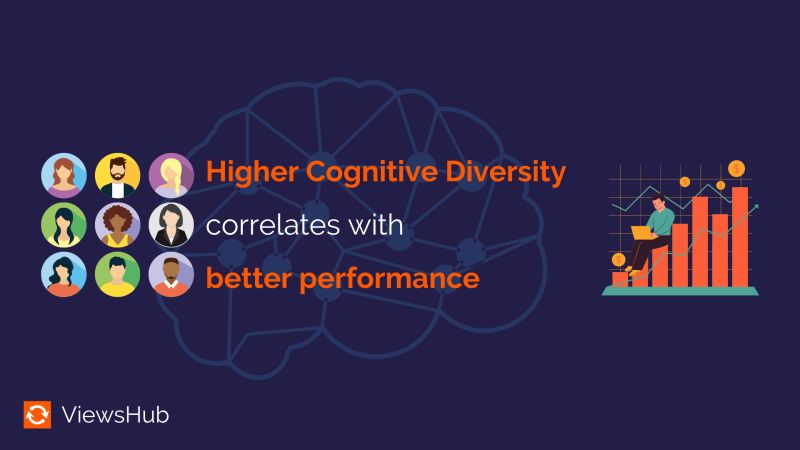“Cognitive diversity is an essential driver behind organizational competitiveness and profitability”
January 12, 2024
The Loop’s editor, Ab Banerjee, outlines the initial findings of ViewsHub’s pioneering study into cognitive diversity within the world’s leading law firms and management consultancies.
In previous editions, we’ve written about ViewsHub’s mission to empower every team in every organization to achieve high performance. This commitment is aimed at boosting productivity and profitability, elevating client service levels, dismantling organizational silos, enhancing cooperation, and increasing employee engagement.
In recent research, three critical factors have been identified as key enablers of high performance: cognitive diversity, psychological safety and a growth mindset.
Cognitive diversity refers to the variety of ways people work, think, and interact with others. A growth mindset emphasizes the crucial role of continuous feedback for constant growth and development. Psychological safety fosters a workplace environment where team members feel secure enough to take risks, share ideas, voice concerns, and admit mistakes without fear of negative consequences.
These concepts are essential pillars in defining the character and effectiveness of an organization and lie at the heart of our mission here at ViewsHub.
In this edition, we reveal the findings of our cutting-edge research into the relative cognitive diversity among the leading management consultancies and law firms.
Before exploring the initial findings of our study, it’s crucial to first address the significance of cognitive diversity within organizations and its impact on their success.
The case for cognitive diversity
Teams solve problems faster when they’re more cognitively diverse. The Harvard Business Review in 2017 revealed that having greater cognitive diversity in a team or organization can lead to ten times higher productivity and better financial performance.
Juliet Bourke’s 2016 study into cognitive diversity for the Australian Institute of Company Directors also yielded similar conclusions. This research showed that diversity of thought – a “wellspring of creativity” – could enhance innovation in a workplace by 20 per cent. Further, the investigation found that cognitive diversity enables groups to spot risks more effectively, reducing these as a result by up to 30 per cent.
Collaborative research conducted by several American and Brazilian institutions in 2019 also notes the value of cognitive diversity in enhancing workplace productivity and results. It concluded that having a “moderate amount of cognitive diversity” more effectively facilitates a given team’s ability to “perform effectively across changing contexts and align member resources into processes that yield consistency in performance”.
Alternatively, non-cognitively diverse teams can be more inclined towards ‘groupthink’, with the loss of independent thinking and individual creativeness.
Matthew Syed, a highly acclaimed speaker in the field of high performance, champions cognitive diversity as a vital component for success in modern organizations. Syed stresses that in a world where challenges and opportunities are multifaceted, cognitive diversity is not just beneficial but essential. It allows teams to approach problems from various angles, leading to more creative solutions and a competitive edge
The ‘Great Minds Don’t Think Alike‘ report by Scottish Widows provides a compelling analysis of the role that cognitive diversity plays in boardroom decision-making. It shows that boards with a rich blend of different thinking styles are more adept at navigating complex challenges and reaching well-rounded decisions.
By illustrating the tangible benefits of varied perspectives and thought processes, the report underscores the essential nature of cognitive diversity in driving effective, informed governance.

